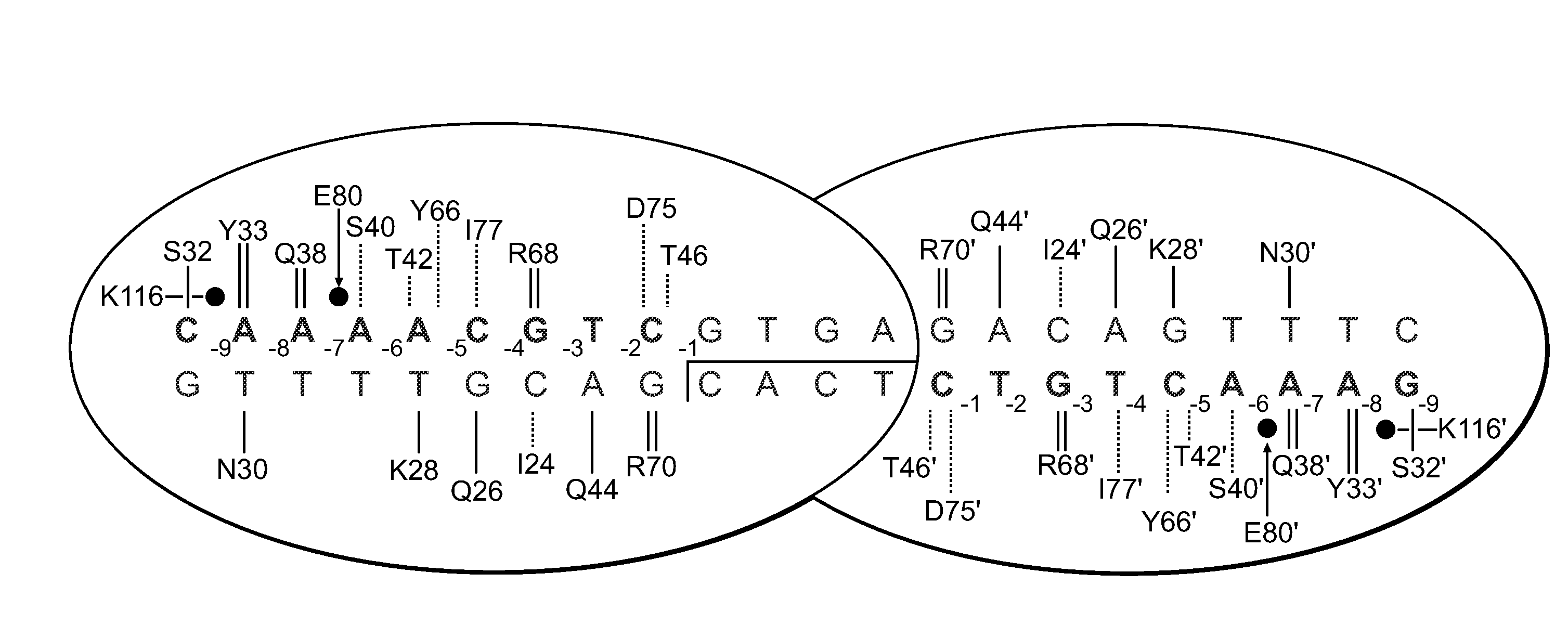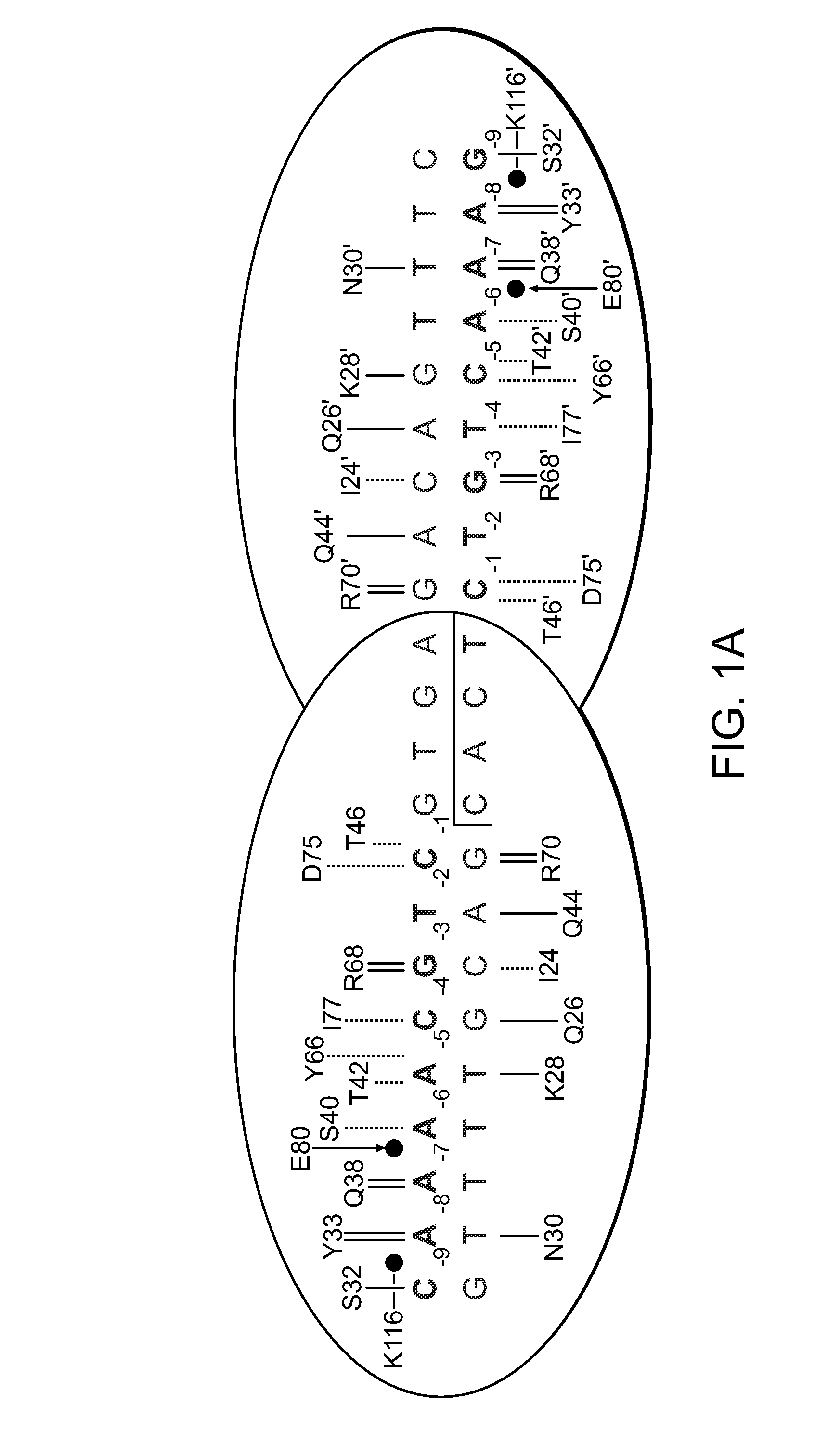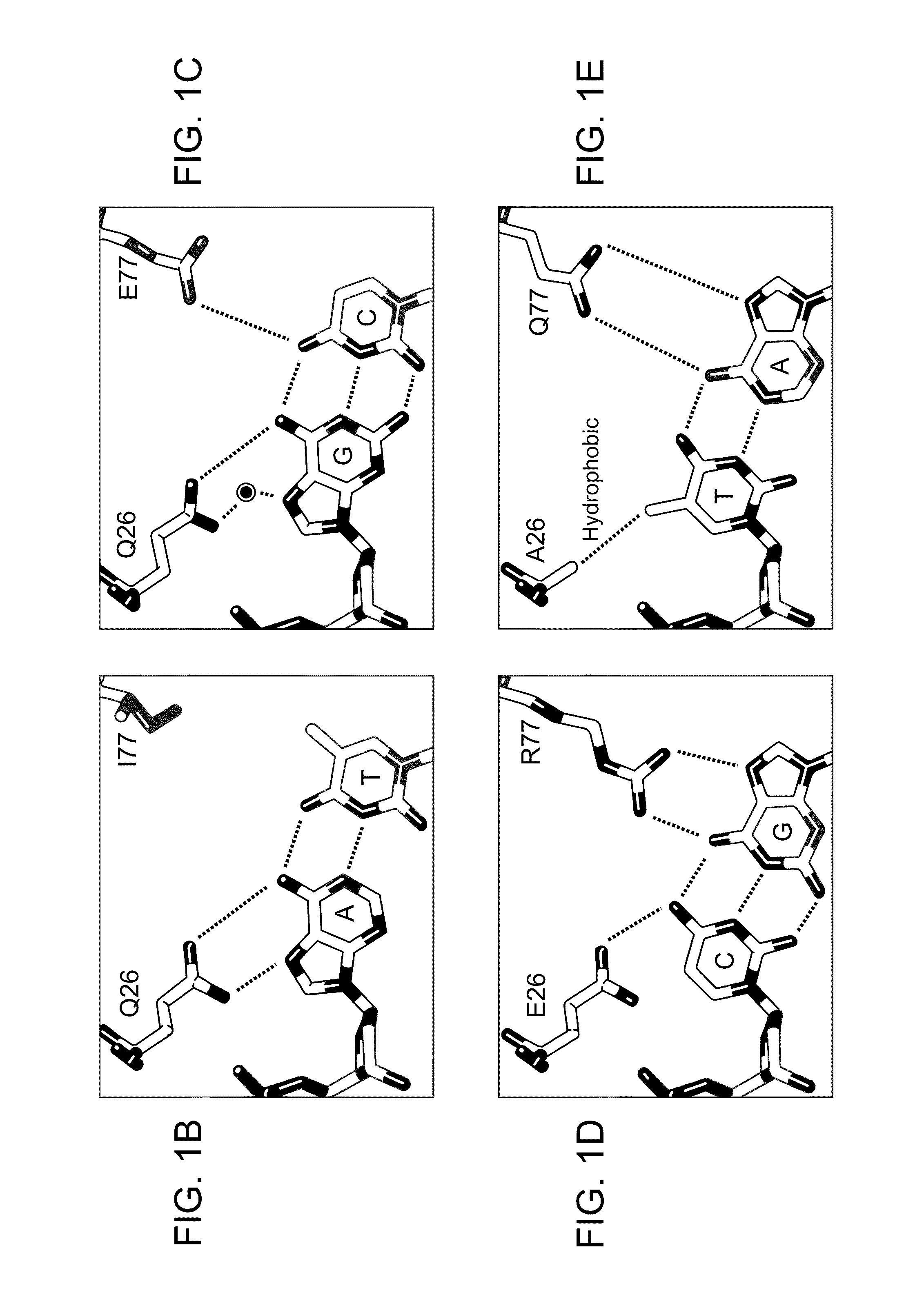Rationally-designed meganucleases with recognition sequences found in dnase hypersensitive regions of the human genome
- Summary
- Abstract
- Description
- Claims
- Application Information
AI Technical Summary
Benefits of technology
Problems solved by technology
Method used
Image
Examples
example 1
Rational Design of Meganucleases Recognizing the HIV-1 TAT Gene
1. Meganuclease Design.
[0171]A pair of meganucleases were designed to recognize and cleave the DNA site 5′-GAAGAGCTCATCAGAACAGTCA-3′ (SEQ ID NO: 15) found in the HIV-1 TAT Gene. In accordance with Table 1, two meganucleases, TAT1 and TAT2, were designed to bind the half-sites 5′-GAAGAGCTC-3′ (SEQ ID NO: 16) and 5′-TGACTGTTC-3′ (SEQ ID NO: 17), respectively, using the following base contacts (non-WT contacts are in bold):
TAT1:
[0172]
Position−9−8−7−6−5−4−3−2−1BaseGAAGAGCTCContactS32Y33N30 / Q38R40K28S26 / R77K24 / Y68Q44R70Residues
TAT2:
[0173]
Position−9−8−7−6−5−4−3−2−1BaseTGACTGTTCContactC32R33N30 / Q38R28 / E40M66S26 / R77Y68Q44R70Residues
[0174]The two enzymes were cloned, expressed in E. coli, and assayed for enzyme activity against the corresponding DNA recognition sequence as described below. In both cases, the rationally-designed meganucleases were found to be inactive. A second generation of each was then produced in which E80 was...
example 2
Rational Design of Meganucleases with Altered DNA-Binding Affinity
[0182]1. Meganucleases with Increased Affinity and Increased Activity.
[0183]The meganucleases CCR1 and BRP2 were designed to cleave the half-sites 5′-AACCCTCTC-3′ (SEQ ID NO: 18) and 5′-CTCCGGGTC-3′ (SEQ ID NO: 19), respectively. These enzymes were produced in accordance with Table 1 as in Example 1:
CCR1:
[0184]
Position−9−8−7−6−5−4−3−2−1BaseAACCCTCTCContactN32Y33R30 / E38R28 / E40E42Q26K24 / Y68Q44R70Residues
BRP2:
[0185]
Position−9−8−7−6−5−4−3−2−1BaseCTCCGGGTCContactS32C33R30 / E38R28 / E40R42S26 / R77R68Q44R70Residues
[0186]Both enzymes were expressed in E. coli, purified, and assayed as in Example 1. Both first generation enzymes were found to cleave their intended recognition sequences with rates that were considerably below that of wild-type I-CreI with its natural recognition sequence. To alleviate this loss in activity, the DNA-binding affinity of CCR1 and BRP2 was increased by mutating E80 to Q in both enzymes. These second-ge...
example 3
Rationally-Designed Meganuclease Heterodimers
1. Cleavage of Non-Palindromic DNA Sites by Meganuclease Heterodimers Formed in Solution.
[0188]Two meganucleases, LAM1 and LAM2, were designed to cleave the half-sites 5′-TGCGGTGTC-3′ (SEQ ID NO: 20) and 5′-CAGGCTGTC-3′ (SEQ ID NO: 21), respectively. The heterodimer of these two enzymes was expected to recognize the DNA sequence 5′-TGCGGTGTCCGGCGACAGCCTG-3′ (SEQ ID NO: 22) found in the bacteriophage λ p05 gene.
LAM1:
[0189]
Position−9−8−7−6−5−4−3−2−1BaseTGCGGTGTCContactC32R33R30 / E38D28 / R40R42Q26R68Q44R70Residues
LAM2:
[0190]
Position−9−8−7−6−5−4−3−2−1BaseCAGGCTGTCContactS32Y33E30 / R38R40K28 / E42Q26R68Q44R70Residues
[0191]LAM1 and LAM 2 were cloned, expressed in E. coli, and purified individually as described in Example 1. The two enzymes were then mixed 1:1 and incubated at 42° C. for 20 minutes to allow them to exchange subunits and re-equilibrate. The resulting enzyme solution, expected to be a mixture of LAM1 homodimer, LAM2 homodimer, and LAM1...
PUM
| Property | Measurement | Unit |
|---|---|---|
| Fraction | aaaaa | aaaaa |
| Fraction | aaaaa | aaaaa |
| Fraction | aaaaa | aaaaa |
Abstract
Description
Claims
Application Information
 Login to View More
Login to View More - R&D
- Intellectual Property
- Life Sciences
- Materials
- Tech Scout
- Unparalleled Data Quality
- Higher Quality Content
- 60% Fewer Hallucinations
Browse by: Latest US Patents, China's latest patents, Technical Efficacy Thesaurus, Application Domain, Technology Topic, Popular Technical Reports.
© 2025 PatSnap. All rights reserved.Legal|Privacy policy|Modern Slavery Act Transparency Statement|Sitemap|About US| Contact US: help@patsnap.com



